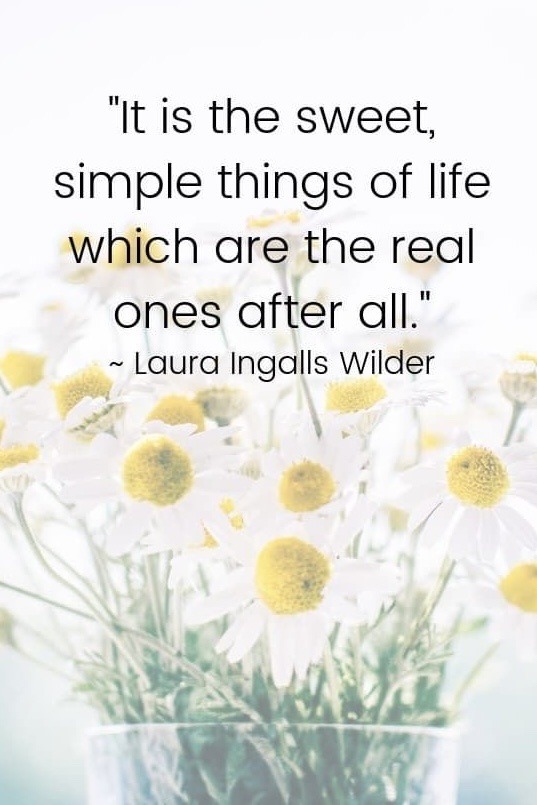#ingalls
Text
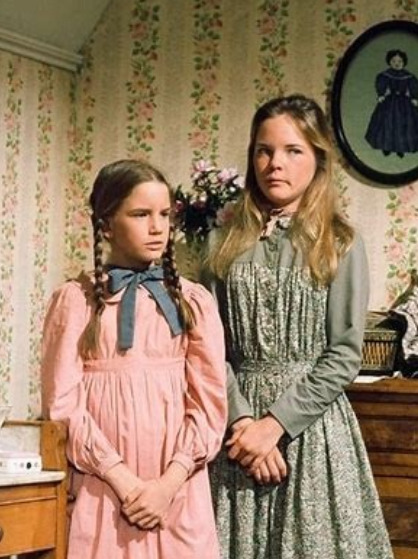
Was ist passiert !
3 notes
·
View notes
Text


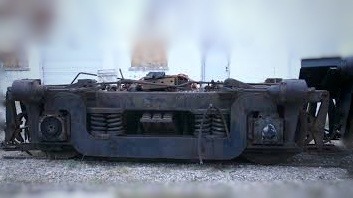


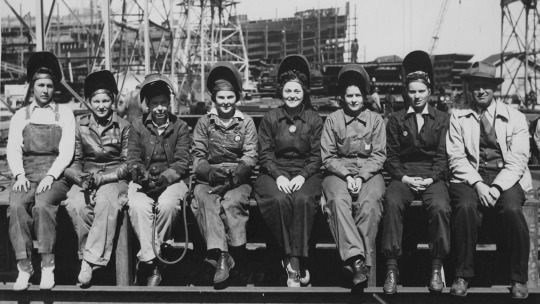


Gulf, Mobile & Ohio #1900, the only Ingalls Shipbuilding 4-S locomotive ever constructed. Operated from 1949 to 1966 by the GM&O. A postwar effort, ran a 1500hp V8 marine diesel on top of apparent AAR type-B trucks. Ingalls Shipbuilding is a shipyard located in Pascagoula, Mississippi, United States, originally established in 1938, is still a leading supplier of ships for the US Navy — not so much a supplier of railroad locomotives tho.
9 notes
·
View notes
Text



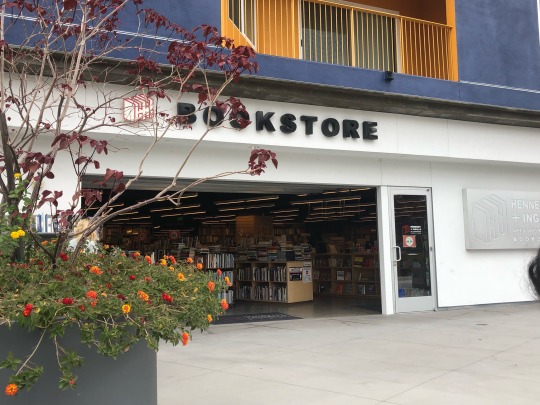
Hennessey and Ingalls - Downtown Los Angeles, CA
#indie bookstore#bookstore#los angeles#book shopping#art books#fabiold reading stuff#hennessey#ingalls#archtecture books
6 notes
·
View notes
Text
BANGBROS - Big Booty Colombian Babe Taking Dick From A White Boy
Mia Madre classic / vintage porn
Unfaithful english mature gill ellis reveals her big hooters
Russian busty webcam girl show
Desi village girl showing boobs n pussy her Bf with audio
Black bitch make her pissy cum for me
Boys crush gay porn long tubes Riding A Hung Cock At The Sauna
Lucky guy gets some steaming hot facesitting act
Cute moany Asian teen fucks til she cant fuck no more
Mother and daugter lesbian fucking
#unselfishness#laparostict#skippery#check-out#overspeech#Ingalls#fortune-telling#reamassment#disciflorous#Yahgan#mid-crowd#overpublicizes#ramforce#luteins#sharp-freeze#Keble#Midgarth#miscategorized#keelman#phanero-
0 notes
Text
For some reason, I'm thinking about Mary Ingalls.
I saw a Goodreads review talking about how ever since they were a kid, they disliked introverted quiet Mary in favor of bold outgoing Laura.
And that take bothers me because it was actually kind of the opposite of that.
In one of her columns written decades before the Little House books, Laura shares the story of the "Is blonde or brown hair prettier?" fight from Little House in the Big Woods. And she frames it as a story of how Mary was intelligent and good with words, and she could say the most cutting things, but the quiet Laura couldn't find the right words to respond with, so she'd be reduced to lashing out physically and thus getting in trouble for it. One sister liking indoor pursuits doesn't make her an introvert, and the other one liking outdoor pursuits doesn't make her an extrovert.
And that's also got me thinking about Mary's later life. Her blindness kept her inside. Whether she was introverted or extroverted, she was forced into a much more solitary existence than Laura was, who could go to school and make friends and run around town at will. Going to the blind school was her one chance in life to really socialize and make friends on a more even footing.
And anyway, one day I'd like to more properly explore the sisterly relationship as presented in these books. Because they are so deeply centered on Laura and her perspective, Mary barely shows up in the first books except to fight with Laura. And then when Mary goes blind, she becomes someone for Laura to take care of--another responsibility to consider as she takes over the role as eldest sibling. It's only in Little Town on the Prairie where the relationship shifts, and we get to see them interacting as two people. Mary admits that she was an insufferable goody-goody sometimes, but Laura also sees and admires the true virtue that Mary has cultivated, and how her blindness has given her a deep spiritual life unlike anything Laura's seen from anyone else. They've at last matured out of childhood rivalry and developed an adult understanding of each other's weaknesses and strengths.
It's just so much deeper and more nuanced than the common view of "quiet goody-goody Mary" and "bold and relatable Laura" would have you believe, and I think it deserves more appreciation.
171 notes
·
View notes
Text
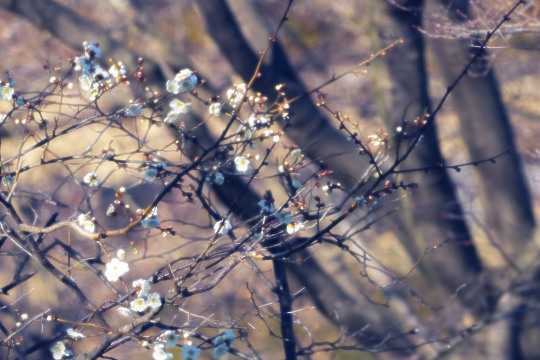
If you truly love nature, you will find beauty everywhere.
心の底から自然を愛していれば、美しさはあらゆる所にあります。
Laura Ingalls Wilder
ローラ・インガルス・ワイルダー
120 notes
·
View notes
Text

177 notes
·
View notes
Text


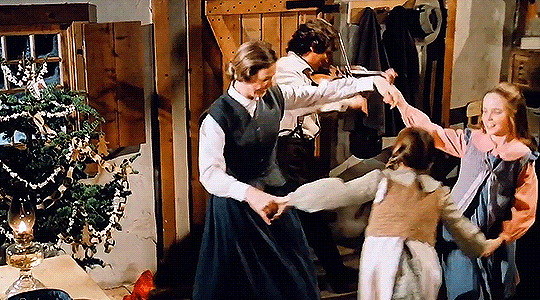

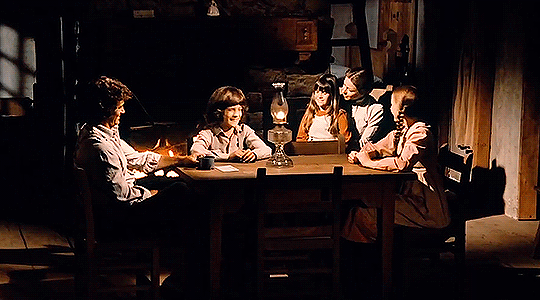
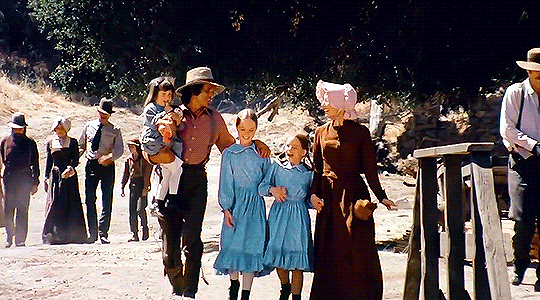
50 Years of the Ingalls Family ❤️
#lhotp#little house on the prairie#lhotpedit#lhotpgifs#laura ingalls wilder#1980s television#1980s tv#1970s tv#1970s television#classic tv#mary ingalls#charles ingalls#caroline ingalls#michael landon#melissa gilbert#karen grassle#melissa sue anderson#i had to get these from a fanvid and only just realized some of the gifs still have the fanvid watermark#oh well#damn liz back at it again with those gifs
64 notes
·
View notes
Text
Round 2, Poll 5: Little House vs The Immortals Quartet
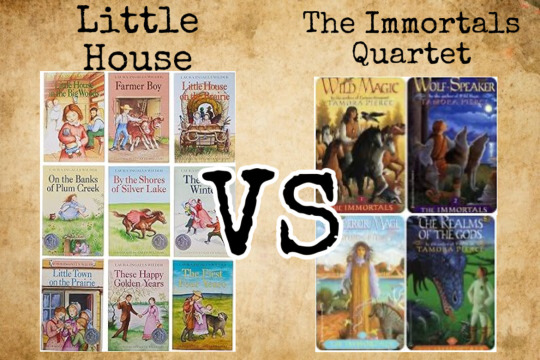
72 notes
·
View notes
Text
Some thoughts on "Little Women" and the "Little House" books
In the endless discussions by Little Women fans of the issue of "Jo vs. Amy," I've noticed a slight recurring theme, both when Amy's defenders discuss Jo and when certain Jo fans put Amy down. It's the idea that the books' narrative inherently favors Jo and is biased against Amy. That Jo is the character whom readers are clearly "supposed to identify with," as if Louisa May Alcott expected most of her young girl readers to be free-spirited, ambitious tomboys who struggle with gender expectations. And that Amy's portrayal is "negative," or at least that we're supposed to view her femininity and love of refinement as slightly silly and annoying.
Not too long ago, I found similar sentiments in an essay by a woman writing about her childhood experience of Laura Ingalls Wilder's Little House books. She wrote that she never identified with spunky, tomboyish Laura, but as a girly girl and as an eldest daughter who felt pressured to be "the responsible one," she related more to Mary. Then she complained that the books seem to expect readers to identify with Laura, and that we're "not supposed to like Mary."
I'm not sure those claims ring true for either of these literary works.
Both Little Women and the Little House books are autobiographical. Louisa May Alcott based the March family on her own family and Jo on herself, while Laura Ingalls Wilder wrote explicitly about herself and her family without changing the names.
In Little Women, I don't feel as if Alcott expected readers to identify more with Jo than with the other three sisters. Yes, Jo gets the most emphasis of them all, but that's because Alcott personally identified with her. Likewise, in the Little House books, Laura is the protagonist because she was the author. It's only natural that she wrote about her childhood from her own viewpoint, not because she thought readers would relate more to her than to her sisters.
Nor do I think Little Women is overly biased against Amy. Is her portrayal complex, and does it reflect Alcott's complex relationship with her sister May? Yes. Does Alcott use Amy to make fun of May's childhood foibles? Yes. Does she make it clear that May often drove her crazy when they were young, and does her envy of May's charms and social life sometimes bleed through the text? Of course! But none of it seems really mean-spirited; her affection and respect for May also come through clearly. Besides, she's just as willing to use Jo's foibles to make fun of herself.
And in the Little House series, do we really think Wilder set out to insult the memory of her beloved and by then deceased sister Mary? Just because she was honest about their childhood sibling rivalry and made readers feel for her envy of her "perfect" sister doesn't mean she wanted the readers to dislike her.
Maybe I'm giving these authors too much benefit of the doubt. But "An author writes about her own family, makes herself the protagonist, and honestly portrays both her closeness and her sibling rivalry with a sister who was very different from herself" doesn't inherently mean "The author expects all readers to identify with her self-insert and dislike her sister."
#little women#little house on the prairie#the little house books#louisa may alcott#jo march#may alcott nieriker#amy march#laura ingalls wilder#mary ingalls
85 notes
·
View notes
Text

Pen and ink drawing for "These happy golden years" by Laura Ingalls Wilder. Stamped and handwritten on back: "From 'These happy golden years.' Please return to Harper & Brothers, Juvenile Dept." Handwritten on back: "No. 2. Laura set herself lessons." From a collection of twenty-four original pen and ink drawings by Helen Sewell and Mildred Boyle used in the first editions of books from the "Little house" series by Laura Ingalls Wilder. 1943.
Rare Book Collection, Detroit Public Library
#laura ingalls wilder#wilder#mildred boyle#helen sewell#drawing#illustration#book#books#old books#book illustration#these happyu golden years#reading#1943#vintage#detroit public library
46 notes
·
View notes
Text

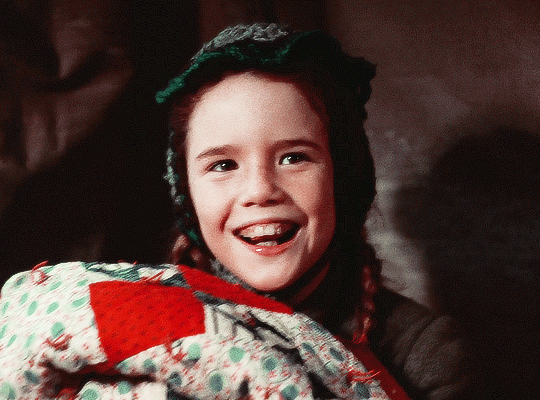
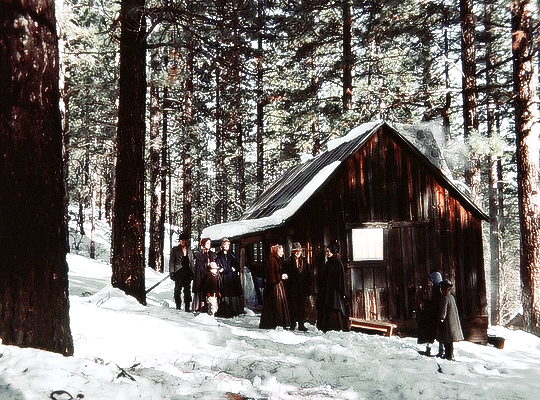
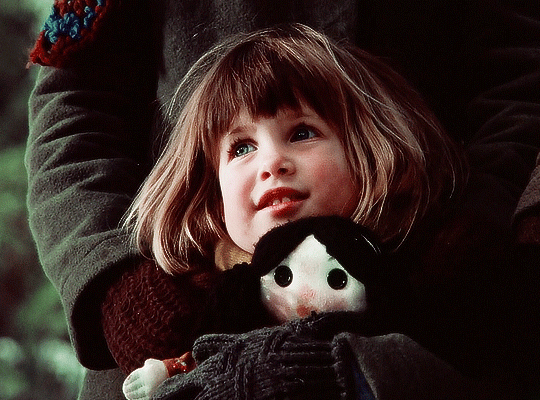

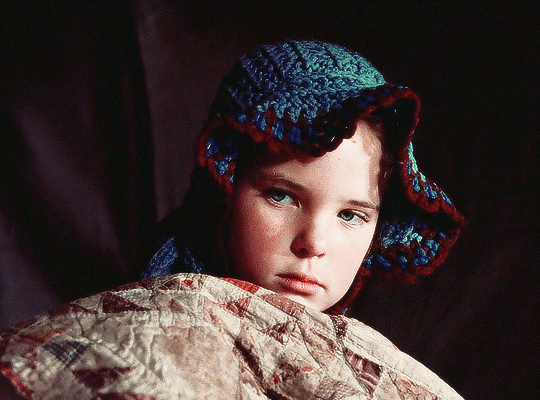
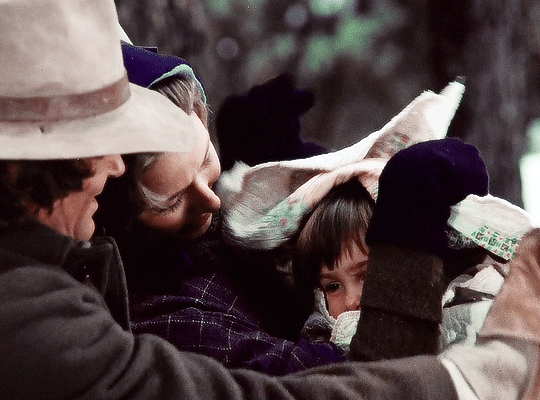
If I had a remembrance book, I would mark down how it was when we left our little house in the big woods to go west to Indian Territory. We had to go, Pa said, because so many people had come to live in the big woods, there wasn't enough game anymore for him to hunt and he feared we might go hungry. Ma said we might never again see Grandma and Grandpa, or Aunt Docia and Aunt Ruby and Uncle George. Though it made me sad, I still thought it a fine thing to go where there had never been a road before. We'd go where the land was more bountiful, he said, and he sold our house and land and cow, and packed whatever would fit in the wagon. I was glad Pa took his fiddle, for it makes a joysome sound. Mary was afraid to go, but I knew nothing bad could happen as long as we had Pa and Jack. Jack is my best and truest friend and Pa says there has never been a better watchdog. I knew there would be rivers to cross and hills to climb, and I was glad, for this is a fair land and I rejoiced that I would see it.
—Laura Ingalls, Little House on the Prairie, "Pilot"
#Little House on the Prairie#1.00 Pilot (Little House on the Prairie)#Laura Ingalls#Charles Ingalls#Caroline Ingalls#Mary Ingalls#Carrie Ingalls#Jack Ingalls#Melissa Gilbert#Melissa Sue Anderson#Michael Landon#Karen Grassle#Sidney Greenbush#Lindsay Greenbush
71 notes
·
View notes
Text
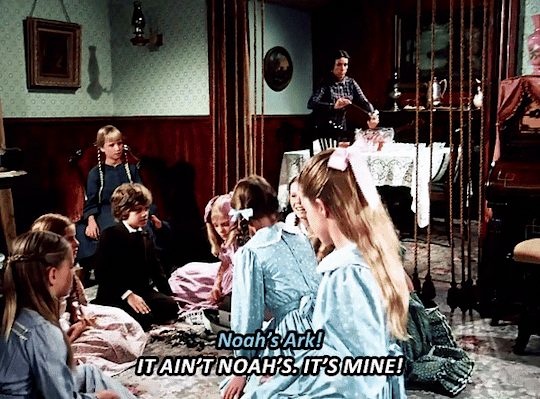
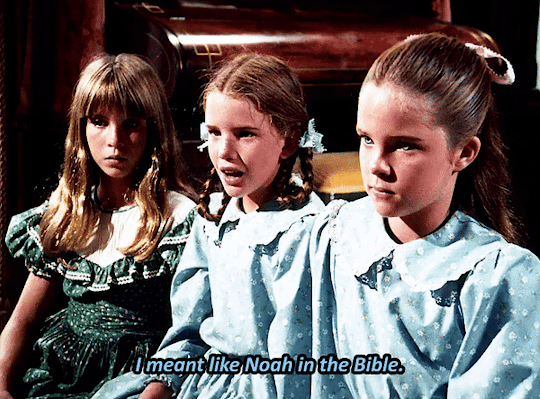
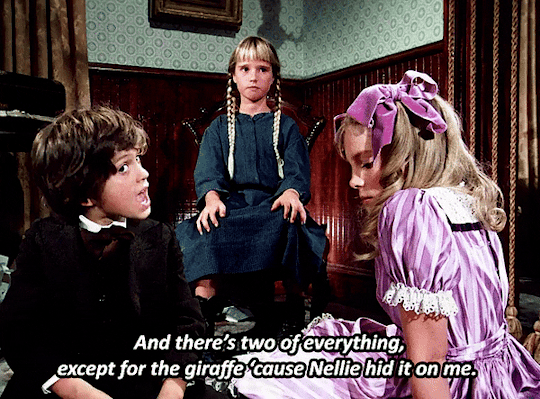
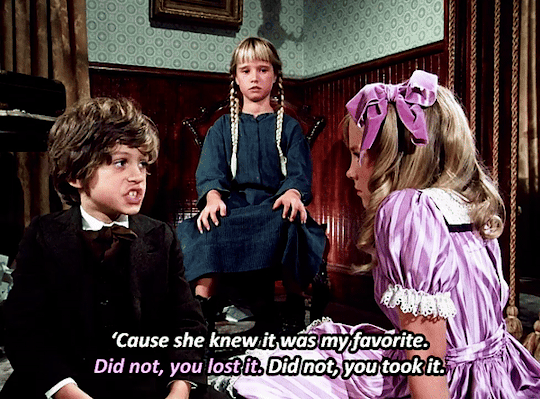
Little House on the Prairie
1x07: Town Party, Country Party
#little house on the prairie#willie oleson#nellie oleson#laura ingalls#mary ingalls#70s#willie and his giraffes <3 !!
28 notes
·
View notes
Text
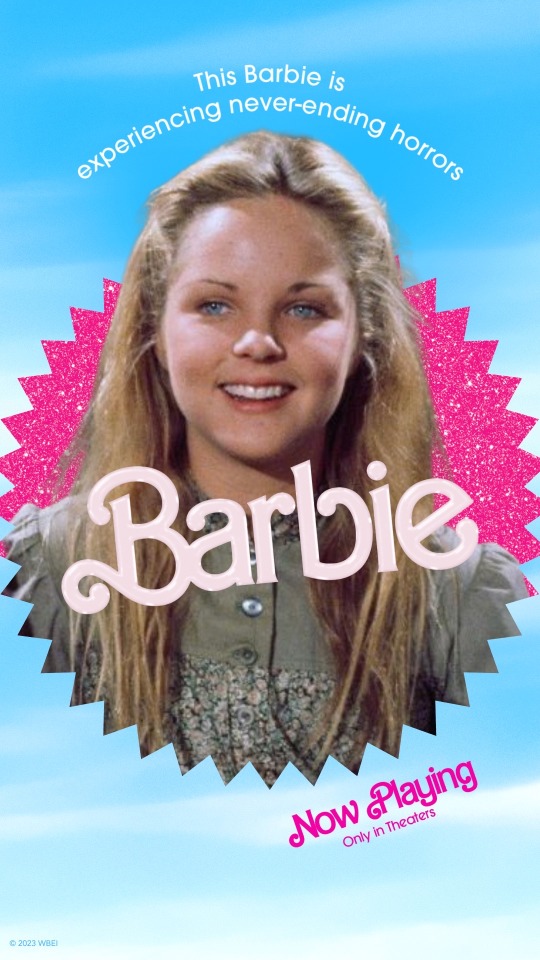
i had to
#one hit after another#just watched an ep where her father in law dies and the money he donated to rebuild the blind school (which burnt down with her child in it)#vanishes due to his debt#anywayyyyyy#mary ingalls#little house on the prairie
92 notes
·
View notes
Text
I think I underestimated how cool it is that Little House books are a "woman remembers her childhood" children's classic by an author from a working-class and rural background. Most working-class books of the genre have urban settings, and most rural girlhood classics come from a family that's in a fairly stable community--maybe not rich, but comfortable enough that they don't have to worry about whether they'll make it through a winter.
Laura Ingalls grew up dirt poor in a family that knew how to grow or build or hunt or make everything that they needed, because they had to. Yet when she grew up, she got into a position where she could publish about it. Which is pretty astounding, because people in her situation are usually too busy doing the farmwork to write about it--they don't have connections to the publishing industry. Yet she did, so we get to hear from someone who knows that farm and small-town setting intimately, and not because she grew up and and ran off to the city as soon as she could escape, but because she still lives it and loves it and advocates for it.
She knows the details of that life and loves it. Like, she genuinely cares about raising the chickens, not as a housewife's hobby, but as an important source of meat, eggs and money for the family. It's grounded, earthy, sensible, but also romantic, because she while she's doing farm work or house work she's noticing the little moments of beauty or thinking about the big issues of life. But it took a long series of coincidences to get this ordinary farm wife into a position of wanting to write, being able to write, and having a national audience for her writing, so I just want to appreciate how amazing it is that it happened.
#little house#laura ingalls wilder#of course now that i've said this i'll think of 157 other authors with similar backgrounds#but it's something that comes to mind a lot while reading her columns#especially in the '20s it's like reading her blog#specifically my blog#in the sense of the entries being 'here's an interesting thing i saw/heard about and here's the bigger issues it made me contemplate'#and her background means that she shouldn't have had an outlet for this but she did and that's pretty cool
397 notes
·
View notes
